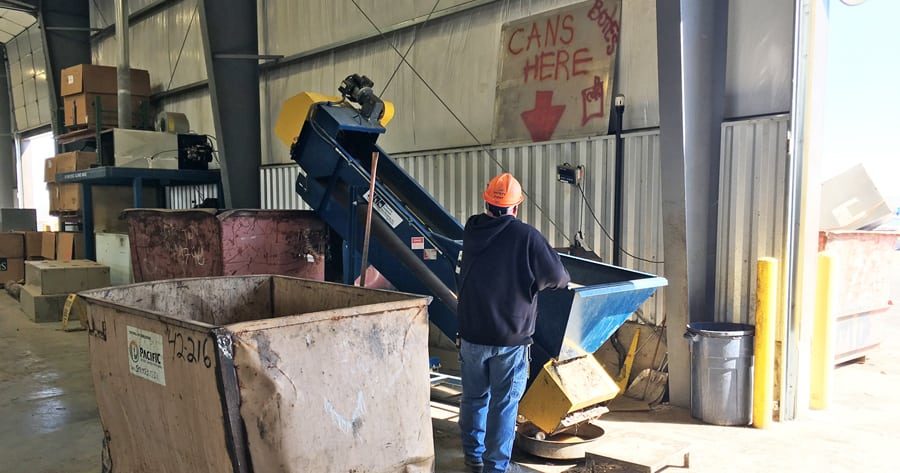
Home » Metals market sees an upswing as economy improves
Metals market sees an upswing as economy improves

April 13, 2017
Pacific Steel & Recycling customers include food processing, construction, towing companies
Long before Jackie Koleber became the manager of Pacific Steel & Recycling’s Kennewick location, she was a customer.
[blockquote quote="People don’t realize they can recycle a dishwasher or a hot water heater or Christmas lights." source="Jackie Koleber, manager at Kennewick's Pacific Steel & Recycling" align="right" max_width="300px"]
“When I was little, I used to collect pop cans. My uncle would take me and my cousins out (to find cans), and we would bring them in when I was little,” she said.
Koleber doesn’t remember what she bought with the money she earned but guessed it was probably candy.
“We loved it. We thought it was the coolest thing. We would do it at least once a month,” she said.
Years later, Koleber went from turning in pop cans to receiving them—as well as an assortment of other metals—when she joined the Pacific Steel & Recycling team in 2007.
“I came from working at a hospital. I was a billing specialist. I was looking for something completely different than the job I had. I grew up doing most of the things boys do—working on cars and motorcycles—and the scrap industry intrigued me,” she said about her transition to the field.
The company has dozens of locations throughout the Northwest, and at the Kennewick location where Koleber works, it recycles a number of items including household appliances such as washers, dryers, plumbing materials and tires. All car parts—excluding fluids—are recyclable. Pacific Steel & Recycling even takes Christmas lights.
“One of the things that surprises me is that people don’t realize they can recycle a dishwasher or a hot water heater or Christmas lights,” she said. “The lights are covered in a plastic cord, but there’s copper in it. Electrical contractors don’t always realize they can recycle the ends of their copper—and it can save them money. You can send it here and not pay to send it to a landfill. It helps for one, with being green.”
If a contractor has a large quantity of material, Pacific Steel & Recycling has a bin service provided in Kennewick, Pasco and Richland. The company will take anything from seven cubic yards to 40 cubic yards, and if a customer lives outside the perimeter of the three main cities, Koleber said they can assess the job to try to work out an arrangement to bring the metals in.
Most of the items it recycles are iron and steel. The largest quantities come from cars and contractors, she said, as well as farm equipment. The year Koleber joined, the price for scrap metal was on an upward swing. But the price paid out is not quite the same as it was prior to the economic downturn.
“Back in 2008, steel would go for probably about $350 a ton,” she said.
Steel is priced by the ton or pound, and currently the value is between $80 per ton to $110 per ton, depending on the quality of the metal.
“Appliances are thin metal with plastic or other materials mixed in. Heavy fixed steel would be the higher-grade steel. That’s what you’d get your $110 for,” she said. “Right now, the way the markets are, you’d probably get $5 for a washing machine. But you’re not paying to dump it. And it’s not sitting in your backyard as ugly yard art.”
The scrap metal market seems to follow the stock market, she said, and it appears to be on an upward trend.
The company ships out six to 10 rail cars each month at 80 tons per railcar. And although it’s not quite to the caliber of shipments in 2009—which saw 10 to 15 cars per week—she believes growth is on the horizon.
“Our year will be much better than it has since 2009,” she said, adding that she noticed signs of the industry picking up in January 2017, and that metals have come up 15 percent in price since the start of the year.
Prices change on a daily basis for what the company calls non-magnetic material such as aluminum, copper, stainless and brass. Steel is typically the only metal with a monthly fixed price.
“We have a contract with our buyers, and we base our prices on whatever our sell-to contract is,” she explained.
When sellers come to the facility, Koleber said they will either be sent to a truck scale or a small indoor scale, depending on the load they have, whether it’s one pound or 100,000 pounds.
Customers include a lot of food processing businesses, construction companies, contractors and towing companies.
But individuals still come in to sell items such as cardboard and aluminum cans, she said.
Pacific Steel & Recycling pays a penny a pound for cardboard, and pop cans run 35 cents per pound.
“We (take) an average of 400 to 500 pounds of cans a day,” she said, adding that aluminum recycling has come full circle for her now that her children have taken an interest in can collecting.
“Oh yeah,” she laughed, “they’re into it.”
Local News Environment
KEYWORDS april 2017





